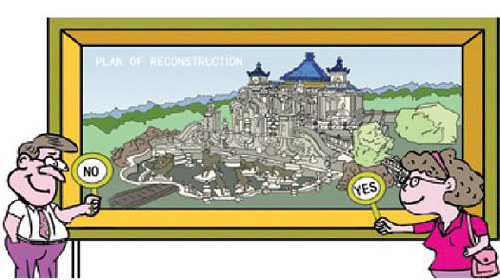|
 |
|
(LI SHIGONG) |
On November 16, 2011, the Education, Science, Culture, Health and Sports Committee of Beijing Municipal People's Congress put forward nine proposals on the city's cultural development, one of which was to reconstruct the Yuanmingyuan, an imperial garden in the Qing Dynasty (1644-1911) also known as the Old Summer Palace, which was looted and burnt down by Anglo-French allied forces in October 1860.
It was once a grand garden that accommodated numerous treasures, but it was reduced to total ruins after the allied forces set fire to it. The ruins of the Yuanmingyuan are a testament not only of the Anglo-French allied forces' brutality, but also the incompetence of the Qing Dynasty's corrupt and unable government.
This proposal again raised long-standing disputes on whether this imperial garden should be rebuilt or not. In 2009, the Hengdian World Studios planned to have a copy of the Yuanmingyuan in southeast China's Zhejiang Province. However, the public's strong opposition curbed this proposal. While supporters argue the reconstruction will help to restore the Chinese nation's grand history, opponents claim that it is a waste of money and damage to historic truth.
Liu Yang (The Beijing Times): Experts, scholars and the media should first pay a visit to the Yuanmingyuan Park (in Beijing's northwest suburb) before they decide to express their ideas on the reconstruction of this imperial garden. By then they will find that without instant renovation many relics will break down and even disappear. When the relic site is no longer there, how can you still expect to see the "symbol of national humiliation? To reconstruct it aims to better protect it.
We may choose to reconstruct several relatively well-protected sites, that is, to reconstruct those parts that have gradually decayed over the years, but not the part burnt by the Anglo-French allied army. In this way, on one hand, the grandiosity of the garden can be partly restored. On the other hand, reconstruction and renovation will not demolish the evidence of Western invasion.
Tong Shujie (Dazhong Daily): Whether you admit it or not, the humiliation attached to the Yuanmingyuan belongs to the past, and today it needs protection. Some facilities and buildings need reconstruction and some relics need good protection, so that they can serve the modern society. Cultural relic protection means not only the maintenance of the very original thing, but also reconstruction and renovation. The combination of the two sides composes perfect protection.
If you want to preserve the "ruins", the historic, educational and archeological value of the buried relics will never get discovered. Such a garden will waste visitors' time. If the relic resources in the Yuanmingyuan Park can be made good use of, they will play a positive role in educating visitors and contributing to world peace. To let the Yuanmingyuan lie there in ruins is wasting valuable resources.
To reconstruct and develop this imperial garden in a rational way is effective protection rather than damage. Some historic relics are decaying in more than a century's rain and wind, so when they are saved from the wild and the earth and used in the reconstruction, they will manage to sustain forever. This is a way to protect them in the most effective and responsible way.
Those who insist on keeping the ruins have ignored the terrible condition of many relics in the park. Their suggestion of letting historic relics lie in wind and rain is an irresponsible and short-sighted idea.
Of course, before the reconstruction starts, there must be detailed protective planning, as well as various historical evidence of the original picture of this imperial garden.
Mao Jianguo (www.xinhuanet.cn): Is there any inseparable internal link between the reconstruction of the Yuanmingyuan and China's national cultural development? Isn't it better to invest the funds of the garden reconstruction to other cultural programs, or the country's overall cultural development, so as to satisfy the people's demand for better cultural life?
Meanwhile, is it really possible for us to restore the Yuanmingyuan? This garden stands for a history of the Chinese nation's humiliation and misery. It's impossible to put back into the garden all the treasures looted by the Anglo-French allied army. So even if the framework is reconstructed, it is no longer the garden it used to be.
The Yuanmingyuan is well-known not because of its grandiosity, luxury and beauty, but because of its historical significance. The looting and burning of this garden implies the danger of accumulating weakness and poverty of a country. It is the burning of this garden that stimulated many Chinese at that time to stand up to save the nation from falling down and being carved up by Western imperialists.
| 